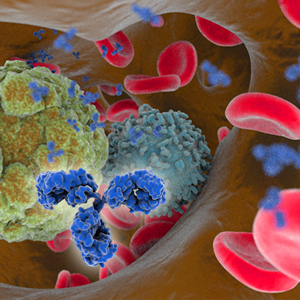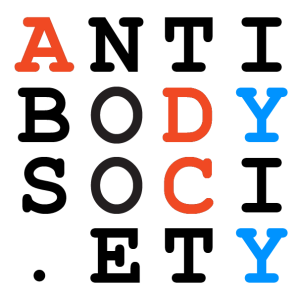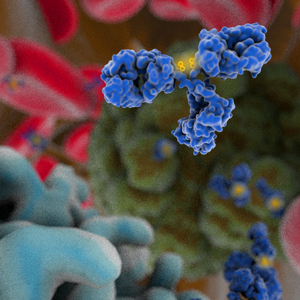 The pace of antibody therapeutics development accelerated in 2017, and this faster pace is projected to continue through 2018. Notably, the annual number of antibody therapeutics granted a first approval in either the European Union (EU) or United States (US) reached double-digits (total of 10) for the first time in 2017. The 10 antibodies granted approvals are: brodalumab, dupilumab, sarilumab, guselkumab, benralizumab, ocrelizumab, inotuzumab ozogamicin, avelumab, duvalumab, and emicizumab. Brodalumab, however, had already been approved in Japan in 2016.
The pace of antibody therapeutics development accelerated in 2017, and this faster pace is projected to continue through 2018. Notably, the annual number of antibody therapeutics granted a first approval in either the European Union (EU) or United States (US) reached double-digits (total of 10) for the first time in 2017. The 10 antibodies granted approvals are: brodalumab, dupilumab, sarilumab, guselkumab, benralizumab, ocrelizumab, inotuzumab ozogamicin, avelumab, duvalumab, and emicizumab. Brodalumab, however, had already been approved in Japan in 2016.
As of mid-December 2017, 10 antibody therapeutics (ibalizumab, burosumab, tildrakizumab, caplacizumab, erenumab, fremanezumab, galcanezumab, romosozumab, mogamulizumab, cemiplimab) were in regulatory review in the EU or US, and regulatory actions on their marketing applications are expected by the end of 2018.
Based on company announcements and estimated clinical study primary completion dates, and assuming the study results are positive, marketing applications for at least 13 antibody therapeutics that are now being evaluated in late-stage clinical studies may be submitted by the end of 2018. Of the 13 candidates, 8 are for non-cancer indications (lanadelumab, crizanlizumab, ravulizumab, eptinezumab, risankizumab, satralizumab, brolucizumab, PRO140) and 5 are for cancer (sacituzumab govitecan, moxetumomab pasudotox, cemiplimab, ublituximab, isatuximab).
Additional antibody therapeutics to watch in 2018 include 19 mAbs undergoing evaluation in late-stage studies with primary completion dates in late 2017 or during 2018. Of these mAbs, 9 are for non-cancer indications (lampalizumab, roledumab, emapalumab, fasinumab, tanezumab, etrolizumab, NEOD001, gantenerumab, anifrolumab) and 10 are for cancer indications (tremelimumab, isatuximab, BCD-100, carotuximab, camrelizumab, IBI308, glembatumumab vedotin, mirvetuximab soravtansine, oportuzumab monatox, L19IL2/L19TNF). Positive clinical study results may enable marketing application submissions in 2018. Brief summaries of these antibody therapeutics are provided in the ‘Antibodies to watch in 2018’ article, which is now available on the mAbs website. A PDF of this open-access article is available here.
Benralizumab granted FDA approval
 On November 14, 2017, AstraZeneca announced that benralizumab (Fasenra), an afucosylated IgG1 mab targeting the alpha subunit of IL-5R found on eosinophils, received a US Food and Drug Administration approval for the add-on maintenance treatment of patients with severe asthma aged 12 years and older, and with an eosinophilic phenotype. The European Medicines Agency’s Committee for Medicinal Products for Human Use adopted a positive opinion on November 10, 2017, recommending the marketing authorization of benralizumab as an add-on maintenance treatment in adult patients with severe eosinophilic asthma inadequately controlled despite high-dose inhaled corticosteroids plus long-acting b-agonists. The European Commission’s decision regarding marketing authorization in the EU is pending. Marketing applications for benralizumab are undergoing review in Japan and other countries. The mAb was in-licensed from BioWa, Inc., a wholly-owned subsidiary of Kyowa Hakko Kirin Co., Ltd. by MedImmune.
On November 14, 2017, AstraZeneca announced that benralizumab (Fasenra), an afucosylated IgG1 mab targeting the alpha subunit of IL-5R found on eosinophils, received a US Food and Drug Administration approval for the add-on maintenance treatment of patients with severe asthma aged 12 years and older, and with an eosinophilic phenotype. The European Medicines Agency’s Committee for Medicinal Products for Human Use adopted a positive opinion on November 10, 2017, recommending the marketing authorization of benralizumab as an add-on maintenance treatment in adult patients with severe eosinophilic asthma inadequately controlled despite high-dose inhaled corticosteroids plus long-acting b-agonists. The European Commission’s decision regarding marketing authorization in the EU is pending. Marketing applications for benralizumab are undergoing review in Japan and other countries. The mAb was in-licensed from BioWa, Inc., a wholly-owned subsidiary of Kyowa Hakko Kirin Co., Ltd. by MedImmune.
The safety and efficacy of benralizumab as a treatment for asthma were evaluated in the WINDWARD program, which included six Phase 3 trials, SIROCCO, CALIMA, ZONDA, BISE, BORA and GREGALE. The randomized, double-blinded, parallel-group, placebo-controlled SIROCCO (NCT01928771) and CALIMA (NCT01914757) trials evaluated the efficacy and safety of a regular, subcutaneous administration of a fixed 30 mg dose of benralizumab for up to 56 weeks in exacerbation-prone adult and adolescent patients 12 years of age and older. Study results were published in 2016. [1, 2] In the 28-week randomized ZONDA study (NCT02075255), the effects of 30 mg benralizumab administered subcutaneously either every 4 weeks or every 8 weeks (with the first three doses administered every 4 weeks) versus placebo on the reduction in the oral glucocorticoid dose while asthma control was maintained in adult patients with severe asthma. The study’s primary outcome measure, percentage reduction in final oral steroid dose compared with baseline while maintaining asthma control, was met. The median final oral glucocorticoid doses from baseline were reduced by 75% in patients who received either dose of benralizumab, compared with a reduction of 25% in the oral glucocorticoid doses in the placebo group (P<0.001 for both comparisons). [3]
- Bleecker ER, FitzGerald JM, Chanez P, Papi A, Weinstein SF, Barker P, Sproule S, Gilmartin G, Aurivillius M, Werkström V, et al. Efficacy and safety of benralizumab for patients with severe asthma uncontrolled with high-dosage inhaled corticosteroids and long-acting β2-agonists (SIROCCO): a randomised, multicentre, placebo-controlled phase 3 trial. Lancet 2016; pii: S0140-6736(16)31324-1. doi: 10.1016/S0140-6736(16)31324-1.
- FitzGerald JM, Bleecker ER, Nair P, Korn S, Ohta K, Lommatzsch M, Ferguson GT, Busse WW, Barker P, Sproule S, et al. Benralizumab, an anti-interleukin-5 receptor α monoclonal antibody, as add-on treatment for patients with severe, uncontrolled, eosinophilic asthma (CALIMA): a randomised, double-blind, placebo-controlled phase 3 trial. Lancet. 2016; pii: S0140-6736(16)31322-8. doi: 10.1016/S0140-6736(16)31322-8.
- Nair P, Wenzel S, Rabe KF, Bourdin A, Lugogo NL, Kuna P, Barker P, Sproule S, Ponnarambil S, Goldman M; ZONDA Trial Investigators. Oral Glucocorticoid-Sparing Effect of Benralizumab in Severe Asthma. N Engl J Med. 2017;376(25):2448-2458. doi: 10.1056/NEJMoa1703501.
The Antibody Society maintains a comprehensive table of approved antibody therapeutics and those in regulatory review in the EU or US. As of November 15, 2017, a total of 9 mAbs have been granted first approvals in either the US or EU in 2017, and marketing applications for a total of 10 antibody therapeutics that have not yet been approved in either the EU or US are undergoing review in these regions.
Please log in to access the table, located in the Members Only section.
Not a member? Please join! Membership is free for students and employees of the Society’s corporate sponsors.
Back in business: gemtuzumab ozogamicin
 Roughly 17 years ago gemtuzumab ozogamicin was first approved by the FDA for the treatment of patients over the age of 60 with CD33-positive relapsed acute myelogenous leukemia (AML), and who were not considered candidates for other cytotoxic chemotherapy.
Roughly 17 years ago gemtuzumab ozogamicin was first approved by the FDA for the treatment of patients over the age of 60 with CD33-positive relapsed acute myelogenous leukemia (AML), and who were not considered candidates for other cytotoxic chemotherapy.
The drug, also known as Mylotarg, was the result of a long-lasting collaboration between Wyeth (acquired by Pfizer in 2009) and CellTech (acquired by UCB in 2004), dating all the way back to 1991. Nine years later it was approved as a single agent under an “accelerated” approval based on the surrogate response rate endpoint that was observed in 142 patients with AML across 3 clinical trials. The approval made Mylotarg the first ADC to hit the US market at the time.
However, things turned quickly for the product. One year into its approval it required a black box packaging warning related to the increased risk of veno-occlusive disease. Initially, the warning was aimed at patients who did not receive bone marrow transplantation, but later the increased frequency of veno-occlusive disease was also observed in Gemtuzumab-treated patients after bone marrow transplantation.
A confirmatory, post-approval clinical trial commenced in 2004, per FDA guidelines for accelerated approval. Results of the randomized Phase 3 SWOG S0106 trial showed a significantly higher fatal induction toxicity rate in gemtuzumab combination therapy group versus the control group receiving only chemotherapy (16/283 = 5.7% versus 4/281 = 1.4%; p = 0.01).
Following the results of SWOG S0106 and the post-marketing experience with the drug, Pfizer decided to withdraw Mylotarg from the market in 2010 at the request of the FDA. The discontinuation was an upset in the ADC field. Upon the withdrawal brentuximab vedotin and trastuzumab emtansine were the only two approved ADCs for years to come. However, the potential of ADC therapeutics has seen a revival and around 60-70 products are in clinical trials at the moment.
Not only the ADC field itself bounced back after this blow, but also gemtuzumab ozogamicin made a recent comeback. Early this year Pfizer resubmitted Mylotarg for regulatory review and both the FDA and the EMA accepted to review the application based on added data from the Phase 3 randomized, open-label ALFA-0701 trial. In this study Mylotarg was evaluated as an addition to the standard induction chemotherapy using an alternative fractionated dosing schedule in 280 adult, de novo, AML patients between 50 and 70 years old. Additionally, a meta-analysis of patient-level data from over 3000 patients in five randomized Phase 3 trials were evaluated.
Now, seven years after discontinuation, gemtuzumab ozogamicin is back in business in the US. The FDA has approved the lower recommended dosage range and the alternative treatment schedule. The authorization now covers single uses or in combination with chemotherapy in a patient population that now also includes adults with newly diagnosed CD33-positive AML, and adults and children 2 years and older with relapsed or refractory CD33-positive AML.
First approval for guselkumab
 On July 13, 2017, the Food and Drug Administration (FDA) approved the biologics license application for guselkumab (TREMFYA). The product, a human IgG1 monoclonal antibody targeting interleukin-23, is indicated for the treatment of patients with moderate-to-severe plaque psoriasis who are candidates for systemic therapy or phototherapy. Approval was based on results from a clinical development program that included more than 2,000 patients in the Phase 3 VOYAGE 1, VOYAGE 2 and NAVIGATE studies. Guselkumab was generated using MorphoSys’ Human Combinatorial Antibody Library technology.
On July 13, 2017, the Food and Drug Administration (FDA) approved the biologics license application for guselkumab (TREMFYA). The product, a human IgG1 monoclonal antibody targeting interleukin-23, is indicated for the treatment of patients with moderate-to-severe plaque psoriasis who are candidates for systemic therapy or phototherapy. Approval was based on results from a clinical development program that included more than 2,000 patients in the Phase 3 VOYAGE 1, VOYAGE 2 and NAVIGATE studies. Guselkumab was generated using MorphoSys’ Human Combinatorial Antibody Library technology.
As of July 13, guselkumab is the eighth antibody therapeutic to be granted a first marketing approval in any country in 2017, following the approvals of brodalumab, avelumab, ocrelizumab, dupilumab, durvalumab, sarilumab and inotuzumab ozogamicin. The Antibody Society maintains a comprehensive table of approved antibody therapeutics and those in regulatory review in the EU or US. As of July 13, 2017, marketing applications for a total of nine antibody therapeutics that have not been approved in any country are undergoing review in the EU or US. In addition, a marketing application for the antibody-drug conjugate gemtuzumab ozogamicin, which was approved in 2000 by the US FDA and subsequently withdrawn from the US market, is undergoing review in the EU and US.
Please log in to access the table, located in the Members Only section.
Not a member? Please join!
Membership is free for students and employees of the Society’s corporate sponsors.
First approval for inotuzumab ozogamicin in the European Union
 The European Commission has granted a marketing approval for the antibody-drug conjugate (ADC) inotuzumab ozogamicin (BESPONSA) as monotherapy for the treatment of adults with relapsed or refractory CD22-positive B-cell precursor acute lymphoblastic leukemia (ALL). Inotuzumab ozogamicin is a CD22-targeting humanized IgG4 antibody conjugated to the drug calicheamicin via an acetyl butyrate linker. The approval of BESPONSA was supported by results from the Phase 3 INO-VATE ALL trial (ClinicalTrials.gov number NCT01564784), which compared the effects of either inotuzumab ozogamicin or standard intensive chemotherapy in adults with relapsed or refractory ALL Results of this study were published in The New England Journal of Medicine in 2016. A biologics license application for inotuzumab ozogamicin for the treatment of adult patients with relapsed or refractory B-cell precursor ALL is undergoing a priority review by the US Food and Drug Administration (FDA); the goal date for their decision is in August 2017.
The European Commission has granted a marketing approval for the antibody-drug conjugate (ADC) inotuzumab ozogamicin (BESPONSA) as monotherapy for the treatment of adults with relapsed or refractory CD22-positive B-cell precursor acute lymphoblastic leukemia (ALL). Inotuzumab ozogamicin is a CD22-targeting humanized IgG4 antibody conjugated to the drug calicheamicin via an acetyl butyrate linker. The approval of BESPONSA was supported by results from the Phase 3 INO-VATE ALL trial (ClinicalTrials.gov number NCT01564784), which compared the effects of either inotuzumab ozogamicin or standard intensive chemotherapy in adults with relapsed or refractory ALL Results of this study were published in The New England Journal of Medicine in 2016. A biologics license application for inotuzumab ozogamicin for the treatment of adult patients with relapsed or refractory B-cell precursor ALL is undergoing a priority review by the US Food and Drug Administration (FDA); the goal date for their decision is in August 2017.
As of July 1, inotuzumab ozogamicin is the seventh antibody therapeutic to be granted a first marketing approval in any country in 2017, following the approvals of brodalumab, avelumab, ocrelizumab, dupilumab, durvalumab, and sarilumab. The Antibody Society maintains a comprehensive table of approved antibody therapeutics and those in regulatory review in the EU or US. As of July 1, 2017, marketing applications for a total of 10 antibody therapeutics that have not been approved in any country are undergoing review in the EU or US. In addition, a marketing application for the ADC gemtuzumab ozogamicin, which was approved in 2000 by the US FDA and subsequently withdrawn from the US market, is undergoing review in the EU and US.
Please log in to access the table, located in the Members Only section.
Membership is free for students and employees of the Society’s corporate sponsors.

